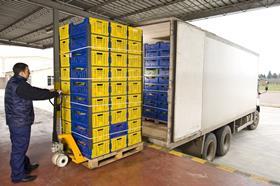
Ecuador’s fresh fruit trade remains open for business in spite of the difficulties posed by the global coronavirus pandemic, according to trade promotion agency ProEcuador.
Harvesting, packing and shipping to Europe and across the world continue to operate safely, and as normal as possible under the circumstances, the agency said.
All ports in Ecuador are 100 per cent operational, and an initial shortage of reefer containers has now been resolved.
However, some shipments of fruit have encountered delays, compounded by a reduced frequency of services on the part of shipping lines.
Categorised as ‘essential businesses’, all Ecuadorean food export sectors, especially bananas, remain operational. To date, fresh produce suppliers have managed to maintain their operations; locating immediate cover to mitigate any labour loss due to self-isolation during the health emergency.
At the same time, Ecuadorean agricultural businesses continue to comply with international biosecurity and safety standards for the export trade, as well as internal food supply, guaranteeing the health of workers, and the strict sanitary control of products in production, transportation, and supply.
Additionally, new asepsis regulations have been incorporated by Ecuador’s agricultural sector, including disinfection arches and the use of antiseptic products recommended by the World Health Organisation for cleaning and decontaminating containers entering the country, and those used for exports.
Juan Carlos Yépez Franco, trade commissioner for ProEcuador’s trade office in London and Hamburg, said: “This is an unprecedented situation throughout the globe but we wish to reassure our customers that Ecuador will not stop exporting; we will continue to supply high quality, safe food to our markets in the UK, across Europe, and worldwide.
“Ecuador plays an important role in the global produce supply chain, and we remain open for business.”
Despite the lockdown on public life, all of Ecuador’s food production and export sectors (bananas, exotics, cacao, coffee, flowers, prawns, tuna, ports, and customs) are functioning.
Food and logistics employees have special permits to go to work, just the same as health professionals, the police, and the army. Meanwhile, non-essential services are closed until further notice.
“So far, Ecuador’s fresh produce suppliers have managed to keep their operations going,” said Yépez Franco.
“Exporters, likewise, continue to do their best to ship products as scheduled, although some delays have been inevitable because of shipping lines reducing the frequency of their services.”
He added that concerns regarding a shortage of packaging materials had not been realised, at least up to now.
Following a spike in demand for food caused by consumer panic buying at the beginning of the pandemic, more recently Ecuador has experienced a small reduction in fresh produce orders.
Yépez Franco noted: “Fresh produce was in high demand but that has stabilised now. Currently, there is a slight reduction in orders of certain fruits, like bananas.
“Since the lockdown was enforced across many European countries, people are shopping only once or twice a week. This reduction in shopping frequency has affected fresh produce during the last few weeks. Nonetheless, we expect demand to return to normal soon.”






No comments yet